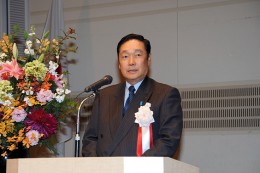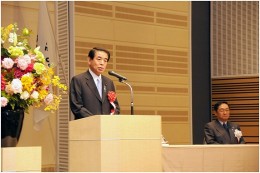CMSECenter for Moral Science and Education
An Open Symposium on Moral Education Hosted by the Institute of Moralogy and Supported by Reitaku University in Collaboration with MEXT, Tokyo Metropolis, the Tokyo Metropolitan Board of Education and SANKEI Newspaper Inc.
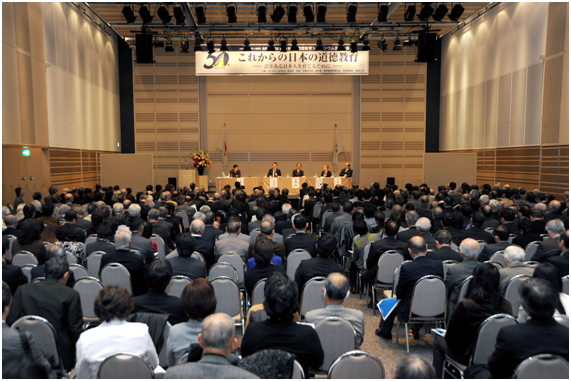 The Institute of Moralogy, a Public Interest Incorporated Foundation, with the support of Reitaku University, MEXT (the Ministry of Education, Culture, Sports, Science and Technology), Tokyo Metropolis, the Tokyo Metropolitan Board of Education, and SANKEI Newspaper Inc., hosted an open symposium on moral education at the Otemachi Sankei Plaza in Tokyo on November 30th,2013. The venue was filled almost to the limit of its capacity by enthusiastic attendees, numbering some 568, of whom about160 were teachers.
The symposium was held to commemorate the 50thanniversary of the program of “Seminars for Educators” which the Institute of Moralogy has been organizing for half a century and which has attracted a total of 160,000 participants to date.
Mr. Mototaka Hiroike, the president of the Institute, spoke in his opening address of how ”various problems such as collapse of the family and school classrooms, bullying and juvenile delinquency have come to the surface. Moral education is indispensable to the regeneration of the Japanese spirit.” The Minister of Education, Hakubun Shimomura, then drew attention to the positive efforts being made in this area by Prime Minister Abe, who regards educational reform as one of the most important issues for his cabinet, and who is on record as having said “Let’s cooperate together to nurture Japanese people who can contribute to the world.“
Professor Hidetugu Yagi, the president of the Japanese Educational Reform organization, gave the key note speech, in which he pointed out that “the moral education needed in the age of globalization should be based on traditional moral values such as diligence, honesty, filial piety and the respect for our culture which we have cherished from the past.”
Reitaku University supplied participants for a panel discussion on the theme, “What educators should do in today’s moral climate in order to nurture in the Japanese a sense of self-respect.” President Nakayama, the director of the CMSE, was one of the four panelists (the others were Professor Yagi, Ms. Ruth Jarman Shiraishi, CEO of Jarman International K.K., and Mr. Susumu Saito, a schoolmaster at the Arakawa Minamisenjyu Second Junior High School), while Professor Ohno, the CMSE’s vice-director, acted as coordinator for those participating in the discussion.
The Institute of Moralogy, a Public Interest Incorporated Foundation, with the support of Reitaku University, MEXT (the Ministry of Education, Culture, Sports, Science and Technology), Tokyo Metropolis, the Tokyo Metropolitan Board of Education, and SANKEI Newspaper Inc., hosted an open symposium on moral education at the Otemachi Sankei Plaza in Tokyo on November 30th,2013. The venue was filled almost to the limit of its capacity by enthusiastic attendees, numbering some 568, of whom about160 were teachers.
The symposium was held to commemorate the 50thanniversary of the program of “Seminars for Educators” which the Institute of Moralogy has been organizing for half a century and which has attracted a total of 160,000 participants to date.
Mr. Mototaka Hiroike, the president of the Institute, spoke in his opening address of how ”various problems such as collapse of the family and school classrooms, bullying and juvenile delinquency have come to the surface. Moral education is indispensable to the regeneration of the Japanese spirit.” The Minister of Education, Hakubun Shimomura, then drew attention to the positive efforts being made in this area by Prime Minister Abe, who regards educational reform as one of the most important issues for his cabinet, and who is on record as having said “Let’s cooperate together to nurture Japanese people who can contribute to the world.“
Professor Hidetugu Yagi, the president of the Japanese Educational Reform organization, gave the key note speech, in which he pointed out that “the moral education needed in the age of globalization should be based on traditional moral values such as diligence, honesty, filial piety and the respect for our culture which we have cherished from the past.”
Reitaku University supplied participants for a panel discussion on the theme, “What educators should do in today’s moral climate in order to nurture in the Japanese a sense of self-respect.” President Nakayama, the director of the CMSE, was one of the four panelists (the others were Professor Yagi, Ms. Ruth Jarman Shiraishi, CEO of Jarman International K.K., and Mr. Susumu Saito, a schoolmaster at the Arakawa Minamisenjyu Second Junior High School), while Professor Ohno, the CMSE’s vice-director, acted as coordinator for those participating in the discussion.
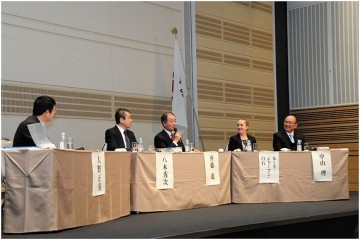
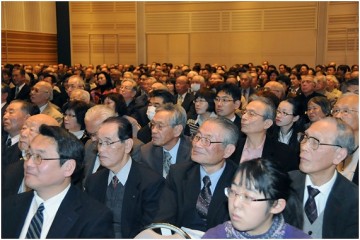 During the course of the exchanges, President Nakayama spoke about what the substance of moral education should be from this time forwards, and about how educators and adults should act to realize this, taking as their starting point the status quo of school education and children here in Japan. President Nakayama also mentioned the need for a holistic pedagogy for moral education, one that can develop the cognitive, emotional and behavioral aspects of students’ understanding through a form of character education in which teachers play a key part as role models.
The Symposium seemed to enjoy great success, a survey questionnaire revealing that almost all participants were satisfied with the event, with many remarking on the positive nature of the occasion and expressing other very favorable opinions.
During the course of the exchanges, President Nakayama spoke about what the substance of moral education should be from this time forwards, and about how educators and adults should act to realize this, taking as their starting point the status quo of school education and children here in Japan. President Nakayama also mentioned the need for a holistic pedagogy for moral education, one that can develop the cognitive, emotional and behavioral aspects of students’ understanding through a form of character education in which teachers play a key part as role models.
The Symposium seemed to enjoy great success, a survey questionnaire revealing that almost all participants were satisfied with the event, with many remarking on the positive nature of the occasion and expressing other very favorable opinions.
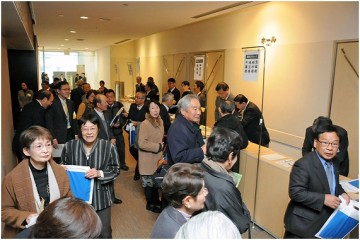
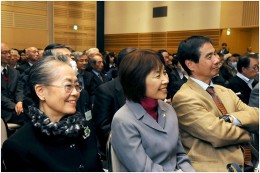
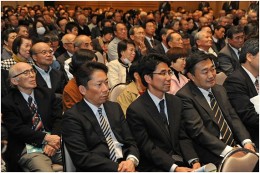 As for the symposium, see also the Japanese article in the Sankei newspaper.
As for the symposium, see also the Japanese article in the Sankei newspaper.
